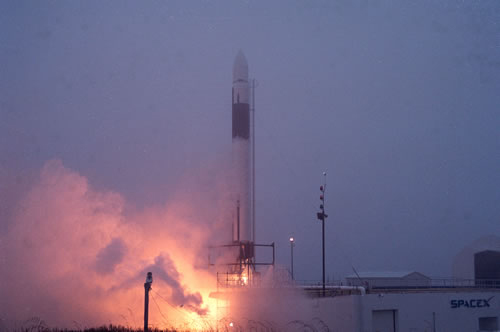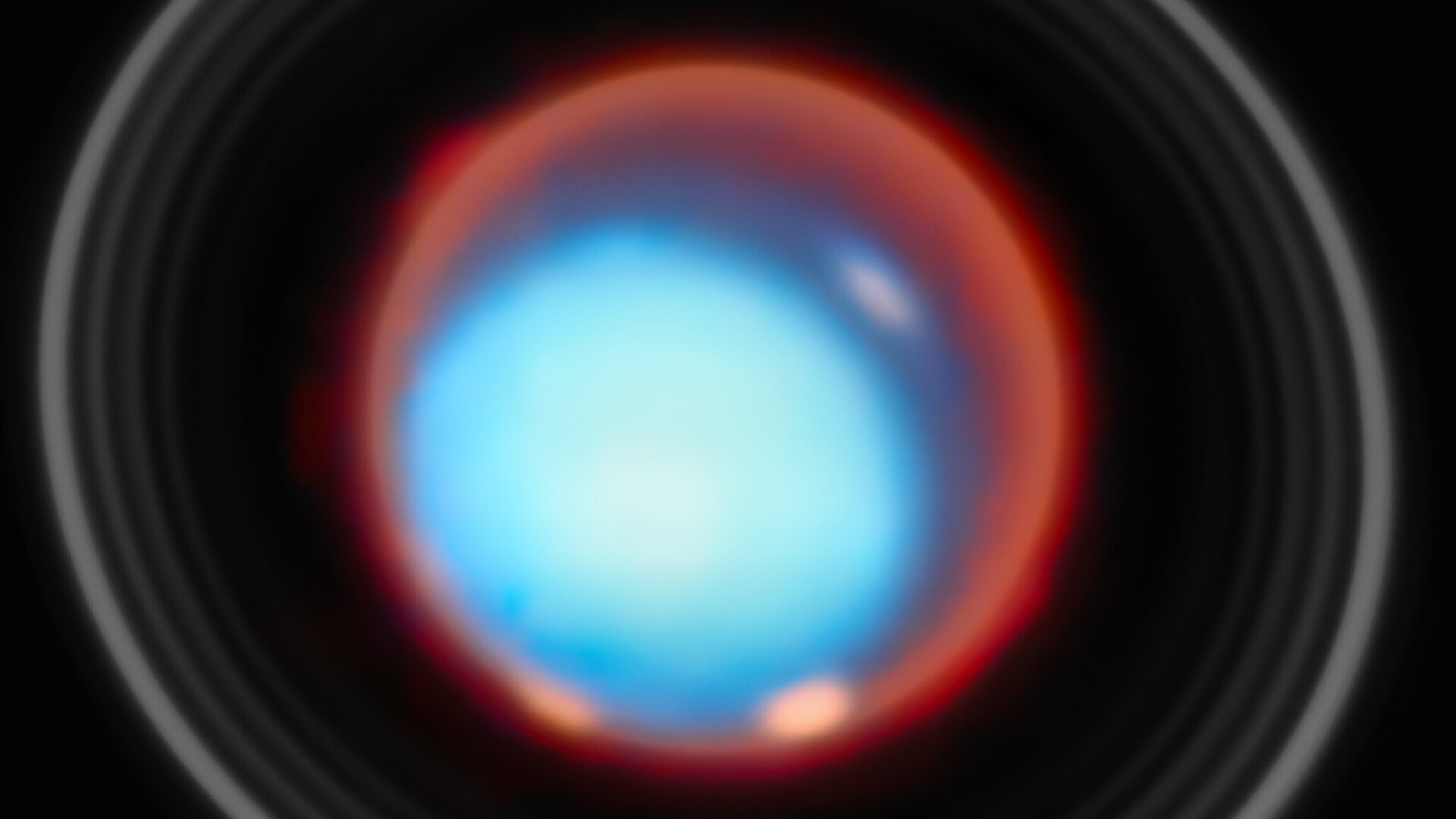SpaceX Private Rocket Shifts to Island Launch

Breaking space news, the latest updates on rocket launches, skywatching events and more!
You are now subscribed
Your newsletter sign-up was successful
Want to add more newsletters?

Delivered daily
Daily Newsletter
Breaking space news, the latest updates on rocket launches, skywatching events and more!

Once a month
Watch This Space
Sign up to our monthly entertainment newsletter to keep up with all our coverage of the latest sci-fi and space movies, tv shows, games and books.

Once a week
Night Sky This Week
Discover this week's must-see night sky events, moon phases, and stunning astrophotos. Sign up for our skywatching newsletter and explore the universe with us!

Twice a month
Strange New Words
Space.com's Sci-Fi Reader's Club. Read a sci-fi short story every month and join a virtual community of fellow science fiction fans!
LOGAN, Utah--Space Exploration Technologies Corporation(SpaceX) of El Segundo, California is putting in place private rocketfacilities at a Kwajalein Atoll launch area in the western Pacific Ocean.
Yet the going has been toughfor the private start-up, bankrolled by Elon Musk, chairman and chief executiveofficer of SpaceX.
First, the group's hoped forpremier takeoff of the Falcon 1 booster at the Vandenberg Air Force Base in California was stymied by an on-going delay of a Titan 4 rocket launch carrying aclassified payload. That booster--the last to fly from Vandenberg--remainsground-bound and won't be airborne until this October, if then.
The Falcon 1 at Vandenbergwas being readied to loft TacSat-1, a satellite built and integrated by theU.S. Naval Research Laboratory for the Pentagon's Office of ForceTransformation.
But a far more vexing issuenow faces SpaceX.
After spending an estimated$7 million on its Vandenberg Air Force Base facilities, the private rocket companyis being told to get out of its Complex 3 West launch site.
"It is just, I think, atravesty," Musk told SPACE.com in an interview here at the 19th AnnualConference on Small Satellites, sponsored by the American Institute ofAeronautics and Astronautics and Utah State University.
Breaking space news, the latest updates on rocket launches, skywatching events and more!
Fundamentally unfair
The squeeze play stems fromLockheed Martin moving back to use a Complex 3 East site at Vandenberg forAtlas 5 launches.
"It's like you build yourhouse...somebody else builds a house next to you and tells you to get out of yourhouse. Like, what the hell...after we've made that big investment and everything.We're going to fight that issue because it is just fundamentally unfair," Musksaid.
The Air Force said it hasdiscussed moving SpaceX across the range to Space Launch Complex-4 but has madeno decision to evict the company from its current location.
"We have had discussionswith SpaceX about the possibility of moving to SLC 4 to better serve andprotect all our launch partners, but no decisions have been made," Air ForceMaj. Todd Fleming, a Vandenberg spokesman, said in a written statement Aug 11."We look forward to building strong relationships with Space X, as well asother launch providers, as we work together to provide responsive launch capabilitiesfor our nation. Space X already conducted a successful test from Vandenberg,and we look forward to their future launches from here."
Musk said the U.S. Air Forcehas got to let the company launch from Vandenberg. "There's no two ways about itas far as I'm concerned...or pay for us to move to another pad."
SpaceX signed an agreementwith the U.S. Air Force to use Complex 3 West, with the company then proceedingto make investments in the site, as well as pay for environmental assessmentsin order for their Falcon 1 rocket to roar skyward from the spot.
"So they just can't renderthat investment zero," Musk said. "They are saying that Atlas 5 is moreimportant than Falcon 1, which is true from a national security standpoint," headded.
"But the fact of the matteris...that doesn't mean they can completely shaft us," Musk said.
Kwajalein liftoff date
Meanwhile, SpaceX isreadying its new launch site at Kwajalein. That location had been part of theoverall company plans to orbit payloads from there as well as from California and Florida.
A projected Kwajaleinliftoff date for the firm's two-stage Falcon 1 rocket on its maiden flight islate September.
The customer for thismission is the Defense Advanced Research Projects Agency (DARPA). The rocket'spayload is a FalconSat-2, part of the U.S. Air Force Academy's satelliteprogram. Once in orbit, FalconSat-2 is designed to measure space plasmaphenomena, which can adversely affect space-based civil and militarytelecommunications.
"Our nominal launch date isSeptember 30, but given that this is a new launch vehicle from a new pad, somedelays are likely," Musk said.
Now en route by barge toKwajalein is the Falcon 1 first stage, with the second stage to arrive by airtransportation. Work teams are building up the remote island-based launch pad.
"If everything works welland we're all good to go, it passes all the tests, and we are confident ofsuccess, we will launch on September 30," said Hans Koenigsmann, SpaceX's VicePresident of Avionics. "If there's anything not sure about it, we'll keeptesting. Basically, this is it. We've got to get this right," he told SPACE.comhere at the small satellite meeting.
"It looks like a simple rocket,"Koenigsmann said, but Falcon 1 is a very complex system. At present, there areno plans to static fire the rocket prior to launch, he said, as had previouslybeen done at the Vandenberg launch site.
Many cooks in the kitchen
There are advantages anddisadvantages regarding launch operations from Kwajalein, Musk said.
First of all, there are nopopulation centers nearby, making range safety easier and, hopefully, a littlecheaper, Musk said. Also, any orbit is achievable from Kwajalein, with beingclose to the equator an advantage too, he said.
The logistics oftransporting equipment and hardware to the island launch locale is the biggestissue the firm is now dealing with in readying the Kwajalein site for Falcon 1operations.
A downside is high corrosionat Kwajalein, Musk pointed out. "I don't think there's a place in the worldwith more corrosion. It's the perfect environment of right temperature,humidity and salt spray," he said, with conditions being combated in wayssimilar to precautions taken with Florida-based rocket infrastructure.
Contrasted to Vandenberg,Musk said that the Kwajalein work is being done to satisfy one entity, theEnvironmental Protection Agency. In California, multiple federal agencies hadto be engaged, along with state and county entities.
"Although, ultimately, we dosatisfy all of them, it just takes a lot of time when there are so many cooksin the kitchen," Musk explained.
Customers like what theysee
Musk said that SpaceX has garnereda trio of new launch contracts, from the Swedish Space Corporation, MacDonald,Dettwiler and Associates Ltd (MDA) of Canada, as well as a commitment to useFalcon 1 by an unspecified U.S. company, with details to follow perhaps in thenext week.
Although the Falcon 1 hasyet to fly, Musk said the customers now signing up for Falcon 1 "like what theysee."
Musk said that he couldfinancially support early failure of the booster.
"If we have threeconsecutive failures...it's not clear to me that we know what we're doing andmaybe we should go out of business," Musk said.
To date, total investment byMusk in SpaceX activities is below $100 million. "Basically, what I'd like todo, after first launch, is look at raising some external funding," he said.
In earlier entrepreneurialefforts, Musk co-founded PayPal, a leading electronic payment system, servingas the company's chairman and CEO. He was the largest shareholder until thecompany was acquired by eBay for $1.5 billion in October 2002.
Onward to Mars
Looking to the future, Musksaid that the larger Falcon 5 launcher, a human-rated booster, along with asuper-heavy lift rocket are all part of the SpaceX plan.
In the next few weeks, Musksaid, plans beyond Falcon 5 are to be announced, "and some of them are going tobe some pretty significant announcements...it's going to make a big splash."
Musk said the reason hefounded SpaceX was to help humanity become a spacefaring civilization. While hewould be happy to see his launch services used for exploration of the Moon, hesaid more distant Mars is the place to build and sustain another civilization.
"I'm less interested in theMoon," Musk said. "I think we saw that movie in the 1960s...it's a 60's re-run. Aremake is never as good as the original."
The primary objective, Musksaid, should be establishing a self-sustaining civilization on Mars. "At thatpoint we become a multi-planet species and all sorts of things are possible. Somy goal with SpaceX is to help make that happen," he added.
"Falcon 1 is just our testvehicle...our first foray. It's not the end game. It is the beginning of thebeginning," Musk concluded.

Leonard David is an award-winning space journalist who has been reporting on space activities for more than 50 years. Currently writing as Space.com's Space Insider Columnist among his other projects, Leonard has authored numerous books on space exploration, Mars missions and more, with his latest being "Moon Rush: The New Space Race" published in 2019 by National Geographic. He also wrote "Mars: Our Future on the Red Planet" released in 2016 by National Geographic. Leonard has served as a correspondent for SpaceNews, Scientific American and Aerospace America for the AIAA. He has received many awards, including the first Ordway Award for Sustained Excellence in Spaceflight History in 2015 at the AAS Wernher von Braun Memorial Symposium. You can find out Leonard's latest project at his website and on Twitter.
